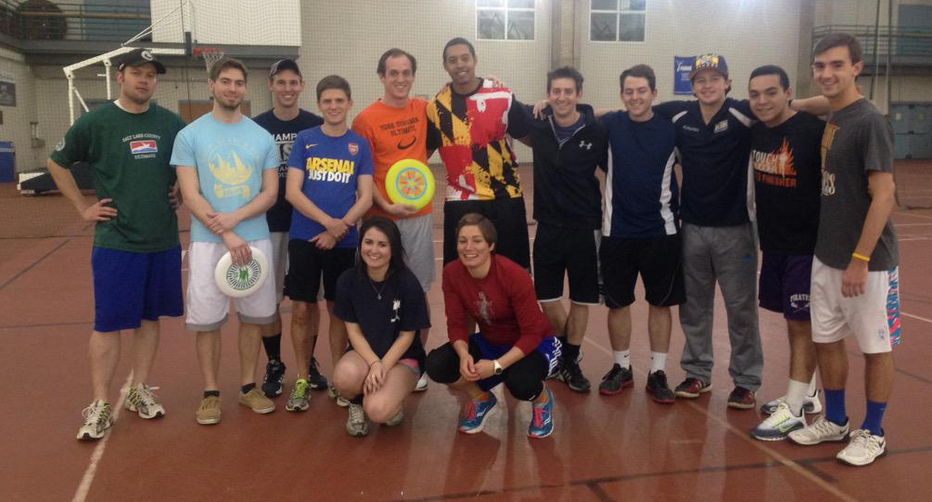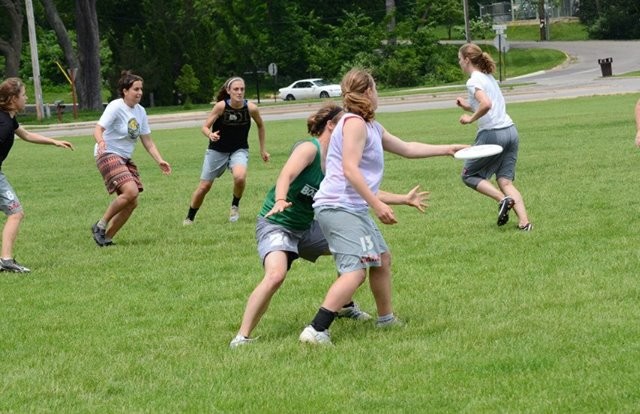 Robyn Wiseman and the Mount St. Mary's Open team after pickup.
Robyn Wiseman and the Mount St. Mary's Open team after pickup.
Last week, I traveled to Emmitsburg, Maryland, home of the Emergency Management Institute. Work travel doesn’t usually provide opportunities to play ultimate, but I promised Bella Donna to throw and work hard every day from I-85 Rodeo (our last tournament) if they committed to the same. In order to fulfil that promise, I needed to seek out some opportunities to play while I was out of town.
So I found Mount St. Mary’s University and contacted the captains of the school’s newly-formed ultimate team. I was hoping to catch a practice or just find someone to throw with when I was done with work-related tasks for the day. I got a response that outlined their schedule and reiterated that the team was very new, but I was welcome to attend.
I had preconceived notions about what practice would entail and looked forward to an intense session. I assumed we would run drills and hoped to scrimmage. I did not expect to have an enlightening experience with recreational ultimate – one that failed to resemble the perfect, structured ultimate world I have known for the past seven years. In 15 minutes of practice, I was reminded that ultimate is not just about successful team strategy; it can also be an accepting, encouraging atmosphere to grow. I remembered what it was like to enjoy playing.
During the first day, I met Jake, an ultimate enthusiast from Utah. That made throwing every day pretty easy. I told him about the Mount St. Mary’s practice on Thursday, which had been moved indoors because heavy rain had closed the fields. It didn’t matter: Jake and I excitedly biked to Mount St. Mary’s in the rain for the 6:30 pm indoor practice.
My expectations of “new” aligned with my experience playing on a new team in 2007 with Wisconsin-Eau Claire. We were a new team, but we had several players who had played before. It turns out that “new” at Mount St. Mary’s meant a couple of them had played pickup, not that a few of them had played club. It was a “new” team in every sense of the word. For most of the two hour practice, we scrimmaged on a large square comprised of two side-by-side basketball courts.
It was the least organized game I have played since my college softball team attempted to play ultimate as an alternative warm-up activity in 2006. Needless to say, as someone who has only played structured ultimate (even at pickup in Madison), I found myself super frustrated because lack of structure meant chaos. I needed structured offense and defense to enjoy playing.
I went through three phases over the course of the scrimmage:
- Extreme frustration – I did not enjoy playing. I complained in my head about lack of everything: offensive organization, forcing, stalling, swinging the disc. I was trying to work up the courage to start coaching and directing.
- Making space – Once I got over being frustrated, I focused on creating space for everyone. For about ten minutes, I prided myself on my ability to make cuts and clear away from the disc so other people had space to make a play. It turns out that this was not fun, because I was not very involved at all; rather, I was on a totally different page and sometimes found myself working against my teammates.
- Acceptance – I got over trying to play ultimate as I knew it and tried their style. I went to the disc, was aggressive, and got involved in plays. I stayed much closer to the disc, sometimes even cutting people off. I also got to throw all sorts of fun things, like jamming the disc into small, rapidly-closing windows.
I had an interesting internal dialog going on as I went through those phases. I realized that as my skills, knowledge, and abilities have grown, the things I love most about the game had shifted. It had become less about the stereotypical “fun” aspects of the game and more about making sure my team’s structure was successful. I lost that sense of awe I once saw in the throws, and forgotten the simplicity of running around with friends. I need the structure because I hate the uncertainty of chaos; structure helps me have fun while playing ultimate.
Once I reframed the experience, I realized that sometimes players on top teams often try to force their version of ultimate on others, when the situation doesn’t warrant it. I found it refreshing when I looked around the Mount St. Mary’s court: I saw people blissfully enjoying the game of ultimate and its culture in its most raw form. No one cared that I could throw a 60 yard flick. They cared that Jake and I love ultimate enough to bike two miles in the rain to play with them. I am glad I got over myself in 15 minutes at that practice; it made me grow a lot as a person and a player because I immersed myself in someone else’s version of the game.
For people who brand this sport on inclusiveness, acceptance, and encouragement, we do not always practice what we preach. In reality, sometimes players judge others for their inability to play ultimate like them, and it creates a divide when all versions of ultimate can coexist.
For example, at spring league in Madison, the span of athleticism and skills range is vast. We have people like Georgia Bosscher, who has been playing league her entire life, matched up with women who cannot throw a forehand. Some want to learn more skills and improve, others just want exercise and more social time. Sometimes I can’t help but ask myself, “Why did that person sign up for Intermediate/Advanced league?” as they run around lost and unwilling to learn how to run the team’s offense or defense. If I start projecting that attitude outward, it would certainly come off as cliquey, judgemental and unwelcoming.
I chatted with Jake for a long time at dinner one night about how it can be challenging to break into an ultimate community and really feel accepted. There can be a disconnect when experienced players with good intentions offer unsolicited advice; sometimes, a new player just wants to meet some new folks and have a good time. Learning dozens of names in a new environment is challenging enough; throw learning new strategy and terminology on top of that, and it can scare people away. We have to find a balance to be inclusive and welcoming.
As we all prepare for the upcoming club season, I challenge you to appreciate ultimate for the things that make it unique rather than its potential to be like something else. I challenge you to go to a pickup game and just play, rather than teach everyone how to do things (of course, answer questions and teach when asked). I challenge you to be an ambassador who welcomes everyone, regardless of skill level or ability.









Comments Policy: At Skyd, we value all legitimate contributions to the discussion of ultimate. However, please ensure your input is respectful. Hateful, slanderous, or disrespectful comments will be deleted. For grammatical, factual, and typographic errors, instead of leaving a comment, please e-mail our editors directly at editors [at] skydmagazine.com.